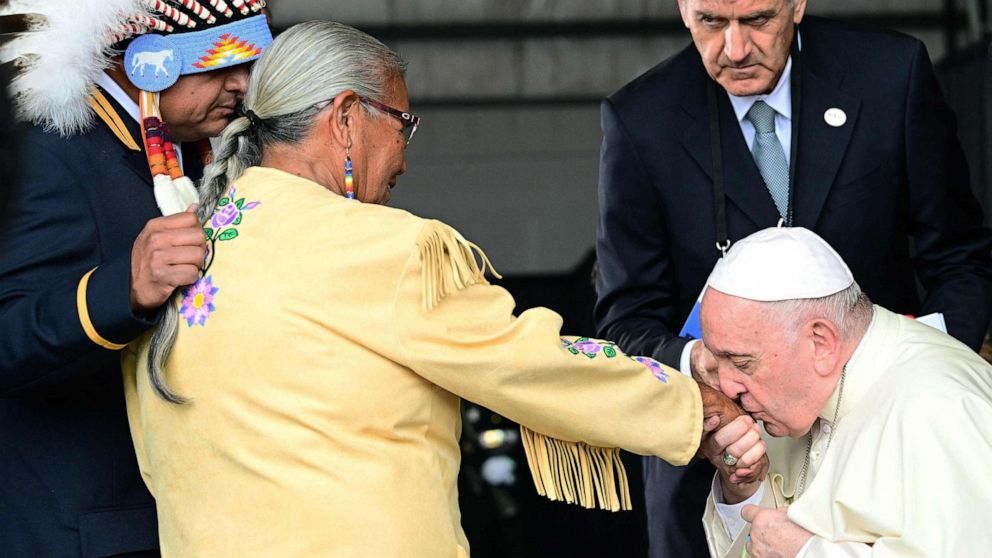
Pope Francis arrived in Canada on July 24 for a six-day “penitential pilgrimage.” In recent years, attention has grown over the abuses committed by churches, Catholic and Protestant, and their government sponsors in the “residential schools” all across Canada that were created in the 19th-century and continued up to the late 1970s. The schools were intended to assimilate the children of indigenous peoples to a European and Christian way of life. In that effort, 150,000 children were forcibly removed from their families over the many decades of the schools’ existence and forced to abandon their cultures, their names, and their religions in order to adopt the culture and values of Christian Canada. Thousands of children died as a result of the poor diets and conditions of the schools, many buried in unmarked graves.
Pope Francis received a delegation representing survivors of the residential schools at the Vatican in March of this year. He extended a formal apology at that time and plans were made for him to visit Canada. On his arrival in Edmonton, Francis was transferred by wheelchair from his plane to a hanger where he received another delegation of those representing survivors of the residential schools. On July 25, Francis again offered a formal apology to the indigenous children for the Catholic Church’s role in the residential schools and for the sins of her members in the unjust treatment of so many children given to their care. The full text of Francis’ statement can be found here. If you are interested in reading more about the history of the residential schools, the online Canadian Encyclopedia has an article.
The Catholic Church, perhaps more than any other international organization, has done much good in the world over the 20 centuries of her existence. At the same time, there have been events, movements, and social realities where the Church failed in her mission of living and bringing the gospel of Jesus Christ to others. Racism, elitism, and, yes, White supremacy, have too often influenced some Catholics in their encounters with others more than has the gospel. Jesus said it would be this way (Matt 13:24-30). And, while He warned against trying to separate the weeds from the wheat before the harvest, that doesn’t preclude our calling to greater faithfulness those who have lost their focus and lost their way.
It is good that Pope Francis offered words of sorrow and begged forgiveness for the sins of Catholics from those who survived these schools. Of course, this only begins the work of healing and reconciliation. True reconciliation would not mean putting these horrors behind us, but learning from them so they never happen again, and empowering those victimized by these schools with the tools to live lives that are meaningful and productive, so they don’t go through life thinking of themselves first and foremost as victims. For them to do so would be a fate worse than what the schools imposed on them.
The Gospel is about redemption. We have all sinned. We have all fallen short of the kingdom. It is time to embrace God’s grace of reconciliation, not only with our brothers and sisters, but with God who is Father of us all.
Be Christ for all. Bring Christ to all. See Christ in all.
